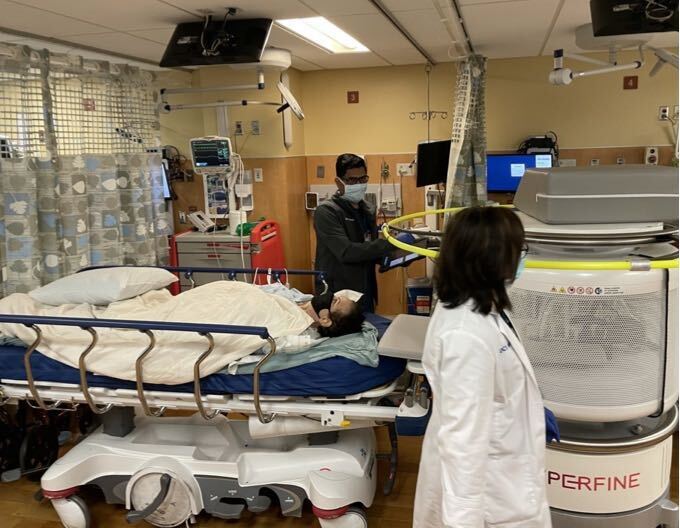Swoop Portable MRI system is the first FDA approved portable MRI device that can be driven to the patient bedside for quick MRI scans
By BRANDON NGUYEN — science@theaggie.org
This past month was National Brain Trauma Awareness Month, recognizing the unique life-changing narratives of patients who have undergone brain injuries and the need for support for these individuals. Fortunately, UC Davis Health has adopted a new portable magnetic resonance imaging (MRI) system that can quickly scan a patient for any major health concerns or brain trauma to help health providers make timely critical decisions.
The Swoop Portable MRI system, created by Hyperfine based in Connecticut, is the first portable MRI device nationally cleared by the Food and Drug Administration, and UC Davis Health is the first to adopt this machine in Northern California.
Dr. Matthew Bobinski, the chair of Clinical Operations and chief of the Division of Radiology at UC Davis Medical Center, described how Swoop has changed hospital operations, especially for very sick patients.
“Instead of this old paradigm where the patient is brought to the scanner in a hospital setting for our inpatient clinic, bringing them from one floor to another part of the wing of the hospital, we bring this scanner to their room,” Bobinski said. “Often, you would say there’s no need for this kind of reverse in roles, but in this case, the target patient population involves very sick patients in the ICU. These patients are connected to multiple devices and monitors, and as such, their transportation becomes logistically very difficult.”
Transportation of a patient can be not only difficult, but dangerous. According to Bobinski, 40% of patients with brain injuries experience complications during transport to the fixed MRI scanner room. Moving a patient requires four different health providers tending to the patient and the patient’s tubes, devices and monitors while moving between floors in a hospital setting, and in a busy hospital, transportation can put the patient at higher risk for adverse outcomes.
Dr. Jennifer Chang, a neuroradiologist and assistant professor in the department of radiology at UC Davis Medical Center, described what the Swoop Portable MRI system looks like.
“The Swoop is a very compact machine, and it has less magnet strength compared to the fixed MRI which has a strength of 1.5 Teslas or 3 Teslas depending on which room we use,” Chang said. “But Swoop is really incredibly powerful in terms of its usage and just attaches sort at the end of the patient’s bed and comes on like a magneto helmet on the patient’s head.”
Dr. Elizabeth Morris, the chair of radiology at UC Davis Health, further described the ease of use with regards to Swoop in a hospital setting.
“What’s exciting about this product is that you can literally drive it to a patient’s bedside, plug it into a standard wall outlet, control it with an iPad and get images of the patient’s brain in minutes,” Morris said. “This reduces the time it takes to make a diagnosis and is less stressful on the patient.”
The ability to make a quick diagnosis is key to Swoop’s revolutionizing technology, and Bobinski added on with some insight into how this portable MRI system will impact the future of healthcare.
“With time, I presume relatively quickly, these scanners will provide much better quality and they will be also approved for not only the brain but also the cervical spine,” Bobinski said. “I would like to make it very clear that it will never be the replacement of the fixed MRI system as Swoops does not image the little details but only the major details needed for a quick assessment. This also has an additional benefit of improving our workflow by opening up time slots for patients who really need the fixed MRI scan, such as children with brain tumors and so on, improving our ability to provide timely care to our sick patients in a timely fashion.”
The saying “time is brain,” which refers to the rapid degeneration of brain tissue during a stroke, is especially relevant in providing urgent care to patients who need it, and Chang abides by this saying in emphasizing the importance of the distribution of health resources in a timely fashion.
“UC Davis is like the county hospital, so we get a lot of the patients who don’t have insurance, and we have to take them all,” Chang said. “We have to figure out who actually needs acute care. Swoop can really be used as a tool to filter out very acute things that are going on in the emergency department and then triage those patients more appropriately, so that either people can get seen more in a timely fashion, or people will be sent to an outpatient setting if it’s not an acute injury.”
Written by: Brandon Nguyen — science@theaggie.org









